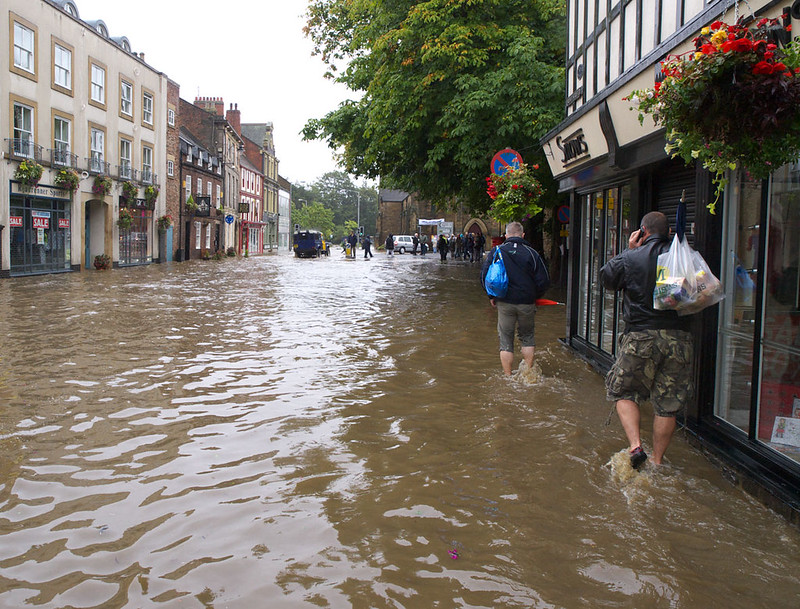UK struggling to keep pace with climate change impacts

Leeds researchers have contributed to a report concluding that action to improve the nation’s resilience to climate change is failing to keep pace with the impacts of a warming planet.
Led by the Climate Change Committee (CCC), the comprehensive independent assessment involving 130 organisations and over 450 contributors considered a catalogue of risks and opportunities affecting every aspect of life in the UK.
Andy Challinor, Professor of Climate Impacts in the School of Earth and Environment, and Tim Benton, Professor of Population Ecology in the School of Biology, led a team of experts focused on the international dimensions of climate risk.
Key findings of their technical report contribution highlight that the world is more vulnerable to the transmission and amplification of risk than it was.
Professor Challinor said: “COVID has demonstrated starkly how interconnected the globe is. Evidence from this report shows how that interconnectedness makes us vulnerable not just to climate change in the UK, but to changes all over the globe.
“Climate can trigger and amplify a whole host of risks, from food and health to governance and conflict. Like COVID, you can’t see it, but its effects are clear.”
The UK is experiencing widespread changes in the climate; average land temperature has risen by around 1.2°C from pre-industrial levels, UK sea levels have risen by 16cm since 1900 and episodes of extreme heat are becoming more frequent.
Since the CCC’s last assessment 5 years ago, over 570,000 new homes have been built that are not resilient to future high temperatures and since 2018 over 4,000 heat-related deaths have been recorded in England.
People, nature, and infrastructure are already vulnerable to a range of climate impacts today and these will only increase in the coming years as the climate continues to change. The longer action to address these risks is delayed, the higher the costs the Government and the UK public will face.
We don’t just need net zero – we need a resilient net-zero.
UK-wide, nearly 60% of the risks and opportunities assessed in the 1500-page report have been given the highest urgency score. The CCC identifies eight priority risk areas which need immediate attention, at the latest in the next two years. This includes risks to:
- Viability and diversity of terrestrial and freshwater habitats and species from multiple hazards
- Soil health from increased flooding and drought
- Natural carbon stores and sequestration from multiple hazards, leading to increased emissions
- Crops, livestock and commercial trees from multiple climate hazards
- Supply of food, goods and vital services due to climate-related collapse of supply chains and distribution networks
- People and the economy from climate-related failure of the power system
- Human health, wellbeing and productivity from increased exposure to heat in homes and other buildings
- Multiple risks to the UK from climate change impacts overseas
There are strong benefits from taking effective adaptation action. The assessment identifies a range of steps that will have benefits in the next five years if implemented on a wide scale, such as building design and retrofit, habitat creation and improved access to information on climate impacts.
Professor Piers Forster, Director of the Priestley Centre and member of the Climate Change Committee, said: “We don’t just need net zero – we need a resilient net-zero. Climate change is already affecting lives in the UK.
“As we build back better the government needs to be putting just as much effort into building resilience as it does into delivering bold emission reductions. We need infrastructure and natural systems that can survive the climate shocks of tomorrow.”
The CCC has asserted that leadership from the UK Government and Governments in Wales, Scotland and Northern Ireland must result in increasing efforts to adapt to climate change to ensure that societal, economic, and environmental goals remain achievable in the face of climate change.
Baroness Brown, Chair of the Adaptation Committee said: “The severity of the risks we face must not be underestimated. These risks will not disappear as the world moves to Net Zero; many of them are already locked in.
“By better understanding and preparing for the coming changes, the UK can prosper, protecting its people, its economy, and its natural environment. A detailed, effective action plan that prepares the UK for climate change is now essential and needed urgently.”
Further information
The Independent Assessment of UK Climate Risk (for the third Climate Change Risk Assessment – CCRA3) is a comprehensive review of the risks and opportunities facing the UK from climate change. The project, involving 130 organisations and over 450 contributors, was led by the Climate Change Committee (CCC). It resulted in an independent report setting out the Committee’s advice to Government informed by a 1500-page technical report collating the latest evidence across a range of key sectors, among many other outputs. Researchers from the University of Leeds contributed to the technical report, providing expertise and advice on Chapter 7: International Dimensions and as part of the peer review panel.
Image: Morpeth Flood by johndal is liscenced under CC BY-SA 2.0
